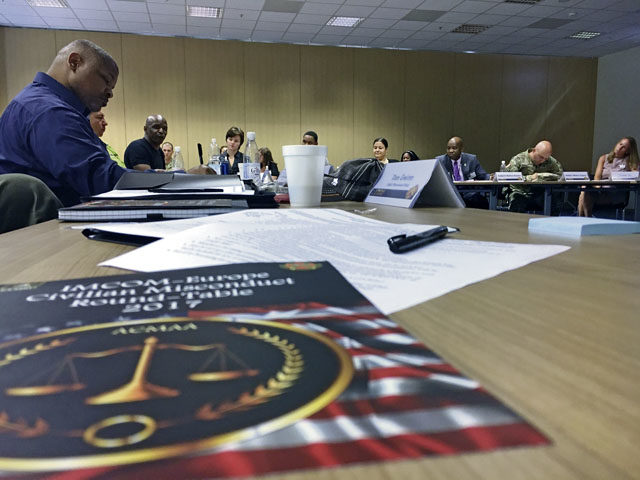Representatives from every major Army installation in Europe gathered at the Assistant Civilian Misconduct Action Authorities roundtable in June, sponsored by Installation Management Command-Europe.
“The Roundtable provided ACMAAs opportunities for positive interaction and collaboration that never seemed likely before this type of event,” said Don Gwinn, USAG RP Civilian Misconduct Program manager. “This roundtable also provided ACMAAs an invaluable opportunity to discuss best practices, identify barriers, recommend changes, and discuss concerns with their colleagues and community stakeholders in related fields.”

The weeklong roundtable was organized through the efforts of Gwinn and his team — Robert Leist and Rick Anderson — after hosting similar events the previous two years that brought other garrison ACMAAs together for training and seminars.
Last month’s sessions included presentations from a variety of experts in related areas, such as legal, law enforcement (both U.S. forces and host-nation police), the Criminal Investigation Command, the Inspector General Defense Criminal Investigative Services, the Army and Air Force Exchange Services Loss Prevention Program, Department of Defense Education Activity school administrators, family advocacy, substance abuse program, behavioral health, safety, and human resources.
“In addition to providing much needed training and bringing best practices together, the roundtable provided a phenomenal forum wherein ACMAAs can meet subject matter experts from throughout the USAG RP community, receive briefings on their programs and learn new ways to interact with their SME’s from their respective Garrisons when addressing misconduct,” explained Gwinn. “The wealth of professionals at the roundtable represented multiple law enforcement authorities, legal advisors, installation access and security professionals, and professionals that can help mitigate future misconduct by addressing the root cause from various counseling and support services from multiple providers throughout our community.”
As such, the roundtable focused on resources available in responding to disciplinary issues as well as preventing them.
The charter of the Civilian Misconduct Program is to address legal infractions/crimes committed by family members, U.S. civilian employees, contractors, retirees and Army-affiliated local national employees — all of whom could also be subject to host-nation laws, military reprimands and possible revocation of logistical support or privileges.
“Most civilians (here) are under the impression that only Soldiers are under specific rules … that the SOFA (Status of Forces Agreement) is so different here that nothing will ever happen to the civilian,” said Leslie Smith, USAG Italy Civilian Misconduct Officer who attended the roundtable, citing a common misperception. In fact, the host nation has exclusive criminal jurisdiction over civilians under the SOFA.
“Civilians don’t understand that logistical support for Army-associated personnel is a privilege that can be revoked for misconduct,” added another roundtable participant, Ken Hughes, Director of Emergency Services at USAG Benelux.
“The Civilian Misconduct Program provides fair, meaningful and impartial resolution of incidents concerning misconduct of civilians overseas,” explained Gwinn. “The program establishes administrative actions and procedures to be taken in response to civilian misconduct to safeguard the resources, facilities and welfare of U.S. Forces communities in Europe.”
The most common types of civilian misconduct cases are similar across the European garrisons and involve shoplifting, property crimes, student misconduct, domestic violence, assault and drug-related infractions. The role of the ACMAAs is to compile reports, conduct interviews, collect data, coordinate with supporting agencies and supply vital information to the CMAA (typically the garrison commander and their deputy) while providing recommendations as well.
How those actions are processed across IMCOM-E was part of the roundtable discussion.
“This event is not only for ACMAAs benefit and knowledge, it’s also beneficial for our stakeholders at USAREUR, IMCOM-E, and garrison internal and external stakeholders to better understand the civilian misconduct process and how we can better work with each other to create a partnership and jointly work toward decreasing misconduct throughout the region,” said Gwinn.
Ultimately, however, it’s the civilians who fall under the program’s auspices who need to be most aware of the ramifications of misconduct, he added.
“The public should be more aware of how misconduct can negatively affect their privilege to remain in the overseas command, and what they can do to prevent misbehavior,” stated Gwinn. “Misconduct does not only affect the individual directly involved; it affects their sponsors, their units, their employment, their other family members and the military community as a whole. The public must realize that their negative actions while overseas are a reflection on how the host nation perceives the U.S. presence in their country.”
Some tips that Gwinn and his staff promote to help prevent incidents of misconduct are:
Make sure that all family members have positive ways to spend their time.
Work with other community members on solving common problems.
Report crimes or suspicious activities to law enforcement immediately, and encourage family members to do the same.
Teach family members to settle arguments without violence in school and the community.
Get involved and help make communities safe and secure places to live.
“The roundtable was an important event that brought together over 60 subject matter experts, attendees, and participants from across Europe,” summarized Gwinn. “The event was a great idea and hopefully IMCOM-E will continue this initiative and make this an annual event for all IMCOM-E ACMAAs. This event provides a very important forum for ACMAAs to interact with colleagues and community stakeholders. We are grateful to all roundtable attendees for their valued participation, support and commitment during the event. We are also grateful that IMCOM Europe gave us the opportunity to be part of an exciting forum that had lots of energy, was well facilitated, and had excellent participation.”


